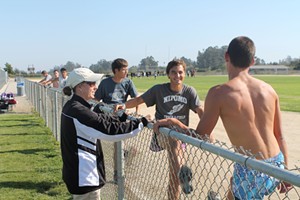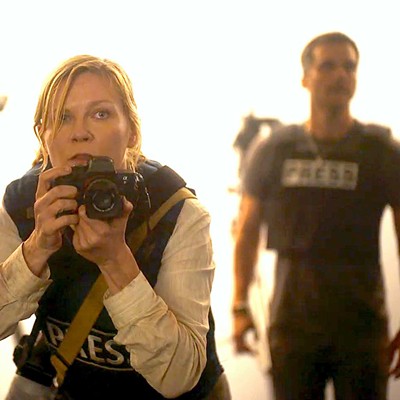
It goes without saying that athletes are a breed like no other. Determined, they push themselves to intense physical and mental limits. They put in the time and make sacrifices out of responsibility to team and self-respect.
When it comes down to it, male and female athletes each bring their own flavor to the spirit of competition. Regardless of physique, blood circulation, or muscular capacity, both kinds of athletes are capable of tremendous feats.
As a former athlete, I’ve worked with male and female coaches. In the back of my mind, I’ve always wondered how coaches perceive athletes of the opposite sex and whether coaching them changes the overall game plan.
This week, the Sun reached out to local coaches and players to get their takes on gender’s role in athletics and found out that true athleticism goes beyond male and female properties.
* * *
Nipomo cross country runners Dylan Gilespie and John Penner definitely stand out. Both boys wear impossibly short, brightly colored running shorts with different prints, and they’re eager to share their thoughts on coaches.
Gilespie, a junior, has had both male and female coaches, but upon reflection, he said the gender of the coach is irrelevant.
“I don’t see how it matters,” he said. “It’s more about their ability as a coach.”
Penner, a senior runner, echoed his teammate’s thoughts.
“I want them to have knowledge and confidence in their coaching,” Penner said. “If they feel confident, we feel confident.”
Both athletes said the male and female coaches’ approaches definitely differ: Male coaches tend to be more intense, and when they instruct athletes to do something, they expect their athletes to do it. Female coaches tend to take more time explaining the rationale behind certain drills and techniques.
Nipomo head cross country coach Arianne Rollinger has worked with her share of male and female athletes over the course of her eight years in charge. This season’s cross country squad is currently sporting 15 boys.
The veteran coach said the differences between male and female athletes are minute and don’t make a difference in the level of success for the athlete.
“Males respond well to direct instruction; they are easier than female athletes sometimes,” Rollinger admitted.
Her biggest challenge when working with males is dealing with the occasional questioning of workouts or instruction, but when she explains the rationale, they understand the purpose.
Regardless of gender, Rollinger said, both sexes require extra emotional support.
“There is a notable emotional component with females, but that varies by athlete,” she said.
For Rollinger, also an English teacher on campus, her approach to her athletes boils down to the individual.
“You have to know your athletes,” she explained. “I treat each athlete as an individual and figure out how to make them a better competitor.”
Rollinger explained that the sport of cross country-—for which participants must have passion to run miles every day-—draws a different kind of athlete.
“These kids have a different agenda; when it comes to competition, their gender doesn’t matter—they’re intrinsically motivated.”
Rollinger happens to be the only female head coach at Nipomo High School this season.
“I think a large part of it is women have children and are married so they focus on that,” Rollinger said. “This position requires an innumerable amount of hours and personal sacrifice—if I had kids, I’d probably focus on them, too.”
On the male side, Righetti golf coach Brian Tomooka is in his third year of coaching. He’s also a baseball coach for the Warriors, but coaching golf marked his first time working with female athletes.
“It was new to me, but I am really enjoying it,” he said. “Coaching any high school sport and interacting with the kids is really the fun part.”
Having worked extensively with both males and females, Tomooka said one notable difference again comes down to the emotional aspect of females.
“Girls can be more emotional, but it isn’t a bad thing—their sport means something to them,” Tomooka said. “Females also ask more questions, which is good, because they are thinking about the game.”
Overall, Tomooka said neither gender is easier to work with. Some athletes are more receptive than others, and the level of direction and instruction between male and females doesn’t differ for this coach, either.
But like Rollinger at Nipomo, Tomooka said coaching really means teaching to the individual—not the gender.
“You have to treat them individually and make adjustments based on their personality,” he said. “With high school athletes, you have to keep things positive and hope they can take constructive criticism.”
Tomooka said that coaching girls’ golf has given him new insight into the female athlete in that he didn’t know just how competitive girls can be in sports.
Take, for instance, one of Tomooka’s golfers, Melanie Johnson. A senior, Johnson also plays center field for the Warrior softball team. Golfing since age 7, Johnson has also experienced her share of male and female coaches; she’s accustomed to having male coaches.
“Female coaches can get closer to you because they have been there and know what you’re going through,” Johnson said. “Male coaches do tend to be more particular.”
For this athlete, the sex of the coach makes no difference.
“It’s important to me that they are well structured, know how to work with a team, keep things organized, and be a leader,” Johnson said.
So there you have it—at the end of the day, being an athlete goes beyond your definition of gender. Male or female, the competitive drive and internal motivation are the key factors for success on the field. Being a coach means looking at your athlete through an individual lens, getting to know your athletes, and finding out what motivates him or her to be a competitor. Athleticism and coaching the opposite sex are where the lines disappear and the real fun begins.
Staff Writer Kristina Sewell is still fiercely competitive. Contact her at [email protected].









